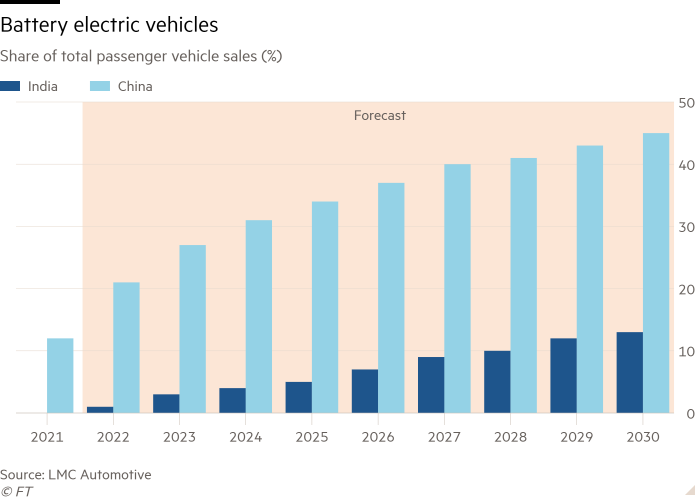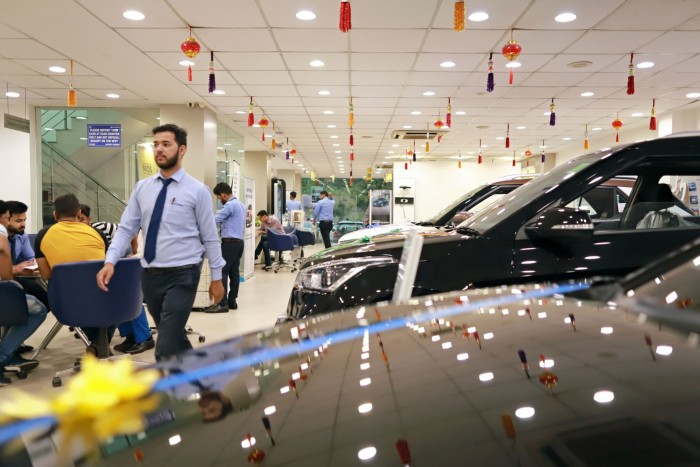[ad_1]
India’s electrical car sector is gearing up from a standing begin. Boosted by state subsidies, some early gross sales of supply automobiles and buses and paranoia amongst companies and politicians about China’s high-tech dominance, a “Made in India” EV trade is beginning to take form.
Alongside semiconductors and renewable energy, Narendra Modi’s authorities is providing incentives to producers of EVs and the superior applied sciences that energy them because it seeks to stimulate manufacturing, reduce reliance on Chinese imports and appeal to international funding.
“As companies across the world look increasingly at a ‘China Plus One’ strategy, India is in a great position to become a global manufacturing powerhouse, and that journey has begun,” stated Anjali Singh, government chair of Anand, an Indian auto parts and techniques group pushing into EVs and different rising automotive applied sciences. “It may take some time, but the aim is to match China soon.”
At this month’s Auto Expo 2023, India’s main biennial motor present, Tata Motors was among the many carmakers displaying EVs, some 45,000 to 50,000 of which it says it is going to promote this 12 months, making it India’s high vendor of battery powered automobiles.
Foreign manufacturers are focusing on India too, together with China’s personal EV frontrunner BYD, which stated it aimed to promote 15,000 automobiles and change into India’s quantity two EV model this 12 months.
The carmaker, China’s high battery-powered model, which presently assembles automobiles from kits in Chennai, instructed the Financial Times that it would increase its manufacturing footprint in India after 2025 if demand for its automobiles warranted it.

Underscoring India’s rising significance to world carmakers, in line with preliminary information it most likely turned the world’s third-largest passenger car market in 2022, behind China and the US and surpassing Japan, with 3.72mn models bought, a 24 per cent improve 12 months on 12 months, in line with LMC Automotive, the consultancy.
“India’s battery electric vehicles market is nascent right now, but holds promise thanks to supportive government policies at both the central and state levels that offer incentives for both the supply and demand sides,” stated Ammar Master, LMC’s director of south Asia.
The coming of zero-emission targets in European international locations is also a “chance to export small-sized EVs from India”, he stated.
However, trade contributors acknowledge that India’s carmakers might want to work onerous to maintain up with China, a lot much less assert management in a subject the place not solely its Asian rival however the US and a few European international locations far outspend it on state subsidies for producers and patrons of plug-in automobiles.
LMC forecasts that battery electrical car passenger car gross sales in India will rise from about 5.5 per cent of complete volumes in 2025 to 13.5 per cent by 2030. In China that share will rise from 34 per cent in 2025 to 45 per cent of the full by 2030, it forecasts.

India has no home manufacturing of lithium batteries, the primary expertise powering the present crop of electrified automobiles, the most costly element in them. Unlike China, it doesn’t mine lithium.
“The EV market in India is primarily an assembly market,” stated Rajat Verma, founder and chief government of Lohum, an organization that recycles used automotive batteries and extracts the uncooked supplies for producing cathode supplies. “Seventy per cent of the value of what we are selling here in India is being produced in China.”
India has thus far supplied firms investing in battery cell expertise simply over $2bn in authorities incentives, and greater than $1bn of subsidies focusing on the sooner adoption of EVs, Verma says.

Adding to the doubts about EVs in India — as elsewhere on the planet — carmakers, suppliers, and policymakers are largely nonetheless hedging their bets as as to if battery-powered automobiles or one other expertise will find yourself dominating the long run marketplace for lower-emission automobiles.
India’s cupboard just lately additionally accredited a “National Green Hydrogen Mission”, aimed toward making the nation a hub for manufacturing and export of hydrogen gasoline.
In India, as in most different international locations, forecasters anticipate most automobile patrons to stay with petrol and diesel automobiles with inside combustion engines for the close to future, partially due to the upper value premium EVs command. Thanks partially to the subsidies, demand for EVs has taken off first and quickest amongst patrons of two- and three-wheeled automobiles, analysts and car makers stated.
“This is a very price sensitive market,” stated Uday Narang, chair and founding father of Omega Seiki Mobility, one in all India’s rising producers of EVs, which makes electrical two- and three-wheelers and supply vehicles. “You cannot look at India through European or American eyes.”
Indian shoppers have been reluctant to splash out on battery-powered automobiles, Tata Motors just lately started promoting an electrical model of its Tiago hatchback that solely prices about $800 greater than the petrol model.
[adinserter block=”4″]
[ad_2]
Source link